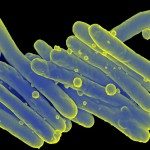Link to Pubmed [PMID] – 22524898
Cell. Microbiol. 2012 Aug;14(8):1287-98
Mycobacterium species, including Mycobacterium tuberculosis and Mycobacterium leprae, are among the most potent human bacterial pathogens. The discovery of cytosolic mycobacteria challenged the paradigm that these pathogens exclusively localize within the phagosome of host cells. As yet the biological relevance of mycobacterial translocation to the cytosol remained unclear. In this current study we used electron microscopy techniques to establish a clear link between translocation and mycobacterial virulence. Pathogenic, patient-derived mycobacteria species were found to translocate to the cytosol, while non-pathogenic species did not. We were further able to link cytosolic translocation with pathogenicity by introducing the ESX-1 (type VII) secretion system into the non-virulent, exclusively phagolysosomal Mycobacterium bovis BCG. Furthermore, we show that translocation is dependent on the C-terminus of the early-secreted antigen ESAT-6. The C-terminal truncation of ESAT-6 was shown to result in attenuation in mice, again linking translocation to virulence. Together, these data demonstrate the molecular mechanism facilitating translocation of mycobacteria. The ability to translocate from the phagolysosome to the cytosol is with this study proven to be biologically significant as it determines mycobacterial virulence.

